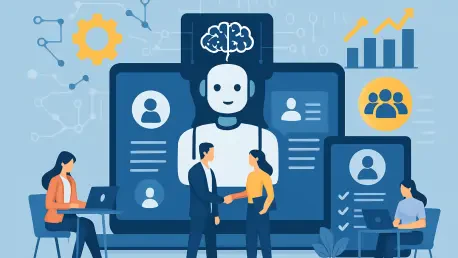The integration of artificial intelligence within customer relationship management platforms is reshaping the human resources approach to talent acquisition this year. As businesses face challenges from hybrid workforces and talent shortages, CRM software, enhanced by AI capabilities, is providing HR departments with innovative tools for identifying, engaging, and retaining top talent. This digital transformation is not only optimizing HR processes but also redefining the traditional roles within HR by aligning employees and candidates as “customers.” This shift towards personalization is not merely about adopting new technology but involves leveraging AI-driven analytics to increase retention and satisfaction rates by forecasting future talent needs and streamlining administrative tasks like resume screening.
AI and CRM in HR Strategy
This year, HR strategy emphasizes using CRM platforms with AI capabilities to transform operations and experiences within HR departments. HubSpot is notably popular due to its intuitive interface and extensive HR integrations, helping teams streamline the recruitment process. Other systems like BambooHR, Workday, and Recruit CRM play a pivotal role in enabling seamless data flow and recruitment-centric features that allow for end-to-end optimization of talent acquisition workflows. One of the significant advantages of using AI in CRM is the automation of repetitive tasks. Tasks such as resume sorting, candidate screening, and employee sentiment analysis can be automated to save time and reduce human error. Despite the evident advantages, there are ongoing debates about privacy, the ethical deployment of AI technologies, and how these may impact personal interactions within HR.
The push towards automation and personalization through predictive analytics means HR professionals can spend less time on manual processes and more on strategic activities that add value to their organization. Conversational AI provides HR teams the opportunity to predict trends and potential challenges before they arise, adopting proactive approaches in managing talent. Issues concerning privacy and ethical considerations remain vital to address, ensuring transparency and fairness in AI implementations. CRM systems must adapt to share data securely and ethically while respecting the privacy of individuals and candidates.
Integration and Challenges
A critical aspect of CRM’s effectiveness in HR is its integration capabilities, which prevent data silos and ensure smooth operations across platforms. Compatibility with existing systems like Microsoft Teams and Google Workspace is essential. Integration is not only about maintaining smooth data and communication channels but also plays an instrumental role in scalability. As companies grow and workforce dynamics become more complex, scalability can pose significant challenges. CRM platforms must be able to support large datasets and diverse organizational needs without sacrificing efficiency. This often requires firms to choose systems that are tailored specifically to their business size and unique requirements.
Scalable CRM solutions should be designed to sustain success in a fiercely competitive talent market, offering predictive insights and streamlining management of the employee lifecycle. The need for adaptability means CRM systems must fit the specific demands of organizations, providing flexible solutions that address changing workforce trends and expectations. Market fragmentation presents obstacles, requiring careful selection of CRM platforms that can ensure both a unified HR ecosystem and the strategic role of HR in the future. Such integration ensures that as workforce needs evolve, systems can expand functionality to accommodate new processes seamlessly.
Future-Proofing HR with CRM
This year, HR strategies are focusing on integrating CRM platforms enhanced by AI to revolutionize operations and experiences within HR departments. HubSpot stands out for its user-friendly interface and comprehensive HR integrations, making it easier for teams to streamline recruitment processes. Furthermore, platforms like BambooHR, Workday, and Recruit CRM are essential in ensuring smooth data flow and provide recruitment-centered features for optimizing talent acquisition workflows. One of the key benefits of implementing AI in CRM systems is the automation of repetitive tasks. This includes automating processes like resume sorting, candidate screening, and employee sentiment analysis, thereby saving time and minimizing human error. However, there is ongoing discussion about privacy concerns and the ethical use of AI, especially regarding its impact on personal interactions within HR. By embracing automation and personalization through predictive analytics, HR professionals can focus more on strategic initiatives rather than manual tasks. It’s crucial for CRM systems to handle data responsibly and ethically, safeguarding individual and candidate privacy.









